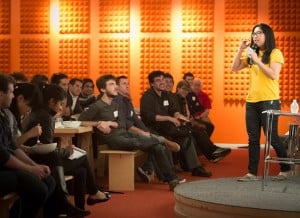Nothing is better than seeing a lowly startup succeed. They push the envelop, think outside of the box, and inspire. The game, however, can be tough to play. For innovators and techies who don’t necessarily have experience or funding, breaking through can seem impossible. This is why accelerators and incubators can be vital to success. They teach creators what and who they need to know. They offer money, office space and, of course, the ubiquitous Demo Day
In major hubs like NYC and London, the list of FinTech accelerators and incubators is seemingly endless. Berlin, Tel Aviv, Singapore and Hong Kong and other major cities also boast their own multitude of hubs. We’ve compiled a list of some of the top incubators and accelerators around the world. If you’re a startup looking for guidance, or businessmen looking for some new connections, here’s who you absolutely must know:
Fintech Innovation lab is based primarily in NYC, but also operating in London, and Hong Kong. Fintech Innovation is an established name, working in conjunction with the Partnership Fund for New York City and Accenture. They held their first lab in NYC in 2010 and haven’t stopped since.
Their 12week program is meant to share insight on the financial sector as well as get startups in touch with wouldbe clients and industry executives. They combine their leadership program with the chance to refine and test products with partnering firms. The results have been generally positive, including an alumni startup that would later be acquired for $175 million. Their connections to big banks and names certainly pays off for them and their startups.
Alumni: Inktank, BillGuard and Standard Treasury

Barclays. Teaming up with Techstars, a mentorship driven accelerator, Barclays is on its third round and currently accepting applications. The last program saw seven out of their ten companies signing with Barclays. Their contracts and terms vary, but some of their companies have seen real paid contracts worth up to £100,000. The exchange includes six percent equity for £12,500 seed money and office space.
The fact that Barclays has been operating with Techstars since 2013, producing steady results specifically in the FinTech sector is part of the real appeal. Not to mention, showcasing their current startups to an audience of 400 CEOs, CIOs and investors. They have also opened up a NYC chapter, that is already in fullswing, with ten bright eyed startups in tow.
Alumni: Everledger, PostQuantum, Aire
Also based in London, Seedcamp is easily one of Europe’s top accelerator programs. Starting with their Onboarding program, they cover an array of topics to get you thoroughly prepared. With continual Founder Feedback, they meet weekly to discuss and work through problems as well as define goals. They also boast their monthly Academy to follow up. Meaning, even when the program is over, startups still have access to workshops and masterclasses. With a US trip and Berlin week, Seedcamp provides a thorough background for startups of all kinds. Their portfolio holds over 138 companies and they are backed by over international thirty venture capital firms.
Alumni: TRData, Elliptic, Revolut

Y Combinator has been around since 2005, and is not limited to FinTech. However, being a general tech incubator definitely works to their advantage. They boast countless success stories and are often termed the most important incubator in the field of technology. With names like Dropbox, Reddit and Airbnb on their list of success stories, it’s hard to doubt the incubator giant.
Despite not being fully rooted in the financesector, FinTech startups from Y Combinator have also flourished. However, with success rates like theirs they are also speculated to have extremely low acceptance rates—perhaps as low as 35%. No one ever said getting into top programs was easy.
Alumni: Twitch, Reddit, AirBnB, Dropbox, Weebly, Airbrite, you get the idea…
Another big name in the US is sixthirty, managed by Jim McKelvey, cofounder of Square. Giving startups up to $100,000 in funding, this program focuses on a flexible schedule with only two days of proper “class” time per week. Here, you can share exactly what you’ve been up to and schedule to speak to the proper mentor for feedback and planning. So how can they afford to shell out $100,000? They don’t invest in as many companies as other accelerators; rather, they put their money where their mouth is. They prefer working with more mature startups that are at the business development stage, and have a working product. They focus mostly on business development, introducing startups to connections and potential customers, aiming to create real traction.
Alumni: Gremln, Data Simply, Upside
Tel Aviv is home to numerous accelerators, including a prestigious program from Citi. Then there is Elevator, backed by the Israeli Leumi Bank. They seem heavily focused on honest feedback and seem to become very invested in the startups they work with. They can make pretty weighty investments in companies they feel will flourish under their guidance. Acting as full strategic, operational and financial partners, getting chosen by Elevator means a lot more than just courses and lessons.
Alumni: LynxGuard, Moburst, BLender
Perhaps not as colorful as Elevator, Visa Europe Collab announced plans earlier this year to spread to Israel. Planting hubs in London and Berlin, Visa is looking to turn out great new tech and has the money to back it up. They intend to take on a minimum of 20 startups, and mature those products into Visaready services.
There is one name that repeatedly pops up in Asia: Startupbootcamp FinTech, Singapore. With the chance to collaborate with over 200 mentors, partners and investors, Startupbootcamp offers plenty of exposure. 10 startups receive roughly $18,000 to get industry experience. Focused on challenging founders and teams, Startupbootcamp is all about education. From how to work with banks, to being a good leader, and understanding your customer, Startupbootcamp appeals to the whole body, mind and soul of startups. Its recent Demo Day boosted some 600 attendees making it easily one of the largest in Asia. Plus, they’re one of the most widereaching programs with partners in over 30 countries and programs around the world.
Alumni: Kashmi, SkolaFund, BankGuard
Hold on to your horses, brighteyed startups…
While there is plenty to learn from the great minds and mentors in accelerators and incubators, past participants also warn of being too eager. These programs are sometimes compared to university. The mentoring and networking work great wonders, but teams must be prepared. Don’t just choose an incubator because they’re willing to give you money. A Visa-run incubator will certainly not be the same as a small, tight-knit program. Secondly, professors and mentors are not gods. Always hear what mentors are sharing, but don’t expect them to know everything or do the real work. Events and speakers are great for learning, but they aren’t going to get your startup of the ground: you are.





